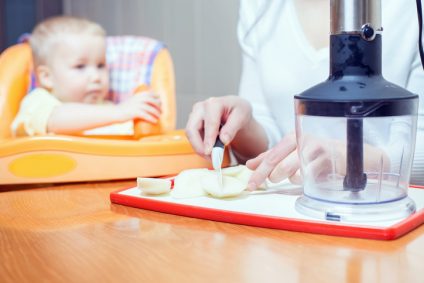
One of the most important aspects of being privileged — whether that is through race, class or the size of your bank account — is to make sure everyone else knows that you are privileged. That’s just as true about motherhood as in any other area. It can be accomplished through conspicuous consumption (extraordinarily expensive strollers, designer baby clothes, live-in help) but in recent years a more subtle form of demonstrating privilege has become popular. Maternal foodwork is an example of this new way to demonstrate privilege.
[pullquote align=”right” cite=”” link=”” color=”” class=”” size=””]Organic food is a form of conspicuous consumption, albeit less flashy than designer clothing.[/pullquote]
As Joslyn Brenton explains in The limits of intensive feeding: maternal foodwork at the intersections of race, class, and gender:
…[M]others today confront increasing social pressure to embody perfection through their foodwork… Extending Hays’ concept of intensive mothering, rich descriptions of feeding children reveal how mothers in this study are discursively engaged with what I call an ‘intensive feeding ideology’ – the widespread belief that good mothering is synonymous with intensive food labour…
Intensive foodwork is yet another expression of the intensive mothering ideal:
… that defines good mothers as those who invest intense emotional and physical labour, as well as significant financial resources, into maximising their children’s potential. This ideology remains the gold standard to which all mothers are held, regardless of their resources…
In a foodscape that encourages mothers to take individual responsibility for keeping children safe and healthy, middle-class mothers in particular may see engaging in expensive and time-consuming food strategies, such as purchasing and preparing organic food and making foods from scratch, as a demonstration of good mothering. Such acts are associated with a deep maternal love and commitment to protecting children’s symbolic purity.
Those engaged in intensive maternal foodwork may claim — and may even believe — that they are improving their children’s health, but the primary purpose of intensive foodwork is to demonstrate privilege.
Intensive feeding encompasses a combination of activities, including shopping at multiple grocery stores for the healthiest foods; finding ways to stretch the family budget to buy organic food; navigating nutritional information and expert feeding advice; negotiating food with children; and teaching children how to develop a taste and preference for particular foods.
Hence women are preparing their own baby food:
Homemade baby food, argues sociologist Amy Bentley, ‘signifie[s] a type of conspicuous consumption, an elite economic and cultural status conferred by virtue of having the option of extra time and energy to make baby food from scratch’.
It’s not healthier than commercially prepared baby food; it’s a demonstration of privilege. And it allows women who practice intensive foodwork to look down upon women who don’t.
For mothers who embrace the ideology of intensive feeding, it is not simply one of many feeding strategies. It is articulated as the strategy well-educated mothers would naturally opt for. Mothers striving for this ideal felt they were outliers compared to other parents, whom they constructed as less educated and less willing to put in the time needed to raise healthy children.
Though it is not discussed in this paper, breastfeeding represents the apogee of intensive maternal foodwork. Breastfeeding requires significant time, significant effort, the ability to remain out of the workforce for months/years or to hold a high status job that is compatible with privately pumping breastmilk multiple times per day. That’s why most of the supposed advantages of breastfeeding disappear when data are corrected for maternal educational and socio-economic status. Breastfeeding doesn’t improve infant health; being privileged enough to be able to breastfeed improves infant health.
Purchasing organic food is another example of the way that maternal foodwork reinforces privilege. Organic food is not healthier than conventionally grown food, but it is far more expensive. It is just a form of conspicuous consumption, albeit less flashy than designer clothing.
Not surprisingly, black mothers may associate intensive maternal foodwork with “whiteness”:
…[M]any black mothers implicitly associated healthy eating with white spaces – like expensive grocery stores – or white foodways, such as the kind of self-deprivation that leads to disordered eating commonly associated with white middle-class women…
When women feed their families they are often reproducing … dominant norms about white middle-class femininity and motherhood. These narratives of foodwork demonstrate that feeding strategies are about far more than health; they are intimately linked to race, class and gender hierarchies…
The author concludes:
Current discourse surrounding health and ethical consumption often promotes expensive ways of eating, and is also ‘linked to ways of performing Euro-Canadian whiteness’. To the extent that embodying these feeding practices defines good mothering, intensive feeding marginalises not only poor mothers, but all mothers of colour, regardless of class…
Intensive foodwork doesn’t make a woman a better mother, just a privileged one.

